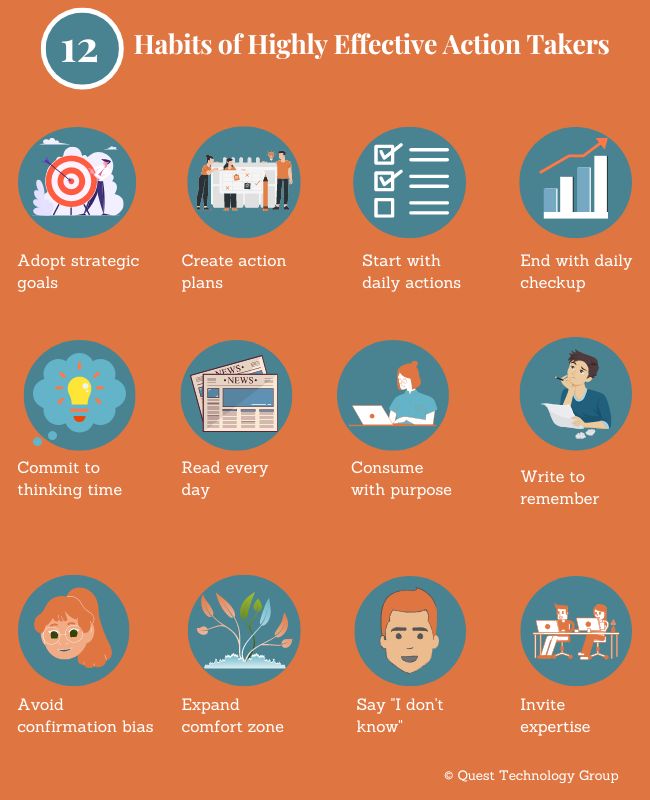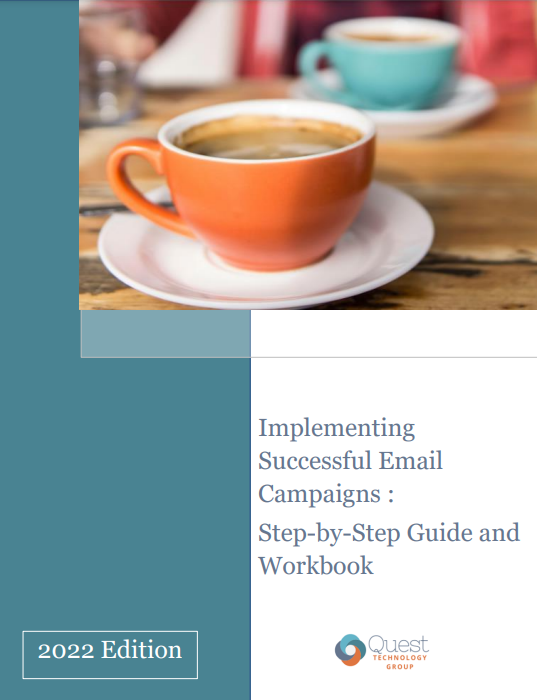12 Habits of Highly Effective Action Takers: Infographic

We all start every day with one thing in common. We have 24 hours, 1440 minutes, 86,400 seconds in our day.
Think about those people you admire, the ones who seem to have unlimited energy and focus. They make amazing things happen day in and day out. They don’t have more hours, minutes, or seconds in their days than the rest of us.
What they have are make-it-happen habits that we can all adopt.
They adopt and communicate clear, written strategic goals.
As Yogi Berra said,
“If you don’t know where you are going, you might wind up someplace else.”
Effective action takers have a clear, written plan that serves as their strategic roadmap both personally and professionally.
They create and review daily, weekly, monthly action plans that align with their strategic goals.
Planning, writing the details down, slavishly following the steps can feel tedious and time-consuming. They are. But unless you are content being a hopeful seat of the pants kind of person, you need to put in the work.
If you’re like a lot of us, annual plans look great on paper for about 30 days. One approach that leads to more manageable, successful planning is The 12 Week Year. Instead of dealing with an entire year which is simply too long and unachievable for a lot of us, this method.
They start each day with a written action plan.
The purpose is simple – make progress toward the written strategic goals. The one thing that derails our effectiveness isn’t the absence of a daily plan. It’s what the plan consists of. There’s a big difference between a to-do list, and the practical action steps that lead to the big outcomes.
They end each day with an honest review of the day.
Reward yourself with a look back at each day. Take 10 minutes to reflect and record the events of your day. You’ll be surprised at the small successes and unexpected progress. Creating the next day’s action items naturally flows, and you will begin the day with focused energy.
They commit to daily thinking time.
Somewhere in our growing up we were told that daydreaming and staring out the window were time-wasters. Not so. There are many stories of highly successful, creative, innovative people who made wandering around time part of every day.
As Warren Buffett said,
“I insist on a lot of time being spent, almost every day, to just sit and think. That is very uncommon in American business. I read and think. So I do more reading and thinking, and make less impulse decisions than most people in business. "

They read widely every day.
Mark Cuban who reads 3 hours every day says,
“I would continually search for new ideas. I read every book and magazine I could. Heck, three bucks for a magazine, twenty bucks for a book…One good idea would lead to a customer or a solution, and those magazines and books paid for themselves many times over.”
They consume information with purpose.
Social media and Google searches have turned us into skillful, time-sucking scrollers. Develop the discipline to get in, get what you need, and get out.
They know the value of remembering what they read.
Note taking, writing things down as you’re consuming information help you effectively consume and learn with purpose.
They know the pitfalls of confirmation bias.
It’s human nature to want to feel validated. We like to be right. But sometimes we aren’t, and we need to accept that.
Confirmation bias encourages us to find the information that tells us we’re right even when we aren’t. It robs us of our ability to be thinkers. Read, consume information with an open mind. It’s a wonderful feeling to learn something new, to confidently change your mind.
They expand their comfort zone every day.
We all like to feel secure and confident in our decisions. But innovation and opportunity don’t happen without stretching in uncomfortable directions. Instead of abandoning your comfort zone, just commit to expanding it a bit each day.
They comfortably say, “I don’t know what I don’t know”.
Think about the people you know who have knowledge and experience you don’t have. They are eager to share what they know with you. Call them, email them, explain the problem you’re trying to solve. Then sit patiently, quietly, and listen.
They invite the expertise of others.
Realize that expertise in something doesn’t make you an expert in everything.
 Don't forget to add these actionable ideas to your OneNote or other favorite note taking app.
Don't forget to add these actionable ideas to your OneNote or other favorite note taking app.
Think about those people you admire, the ones who seem to have unlimited energy and focus. They make amazing things happen day in and day out. They don’t have more hours, minutes, or seconds in their days than the rest of us.
What they have are make-it-happen habits that we can all adopt.
12 Habits of Highly Effective Action Takers You Can Shamelessly Borrow
As Yogi Berra said,
“If you don’t know where you are going, you might wind up someplace else.”
Effective action takers have a clear, written plan that serves as their strategic roadmap both personally and professionally.
Planning, writing the details down, slavishly following the steps can feel tedious and time-consuming. They are. But unless you are content being a hopeful seat of the pants kind of person, you need to put in the work.
If you’re like a lot of us, annual plans look great on paper for about 30 days. One approach that leads to more manageable, successful planning is The 12 Week Year. Instead of dealing with an entire year which is simply too long and unachievable for a lot of us, this method.
The purpose is simple – make progress toward the written strategic goals. The one thing that derails our effectiveness isn’t the absence of a daily plan. It’s what the plan consists of. There’s a big difference between a to-do list, and the practical action steps that lead to the big outcomes.
Reward yourself with a look back at each day. Take 10 minutes to reflect and record the events of your day. You’ll be surprised at the small successes and unexpected progress. Creating the next day’s action items naturally flows, and you will begin the day with focused energy.
Somewhere in our growing up we were told that daydreaming and staring out the window were time-wasters. Not so. There are many stories of highly successful, creative, innovative people who made wandering around time part of every day.
As Warren Buffett said,
“I insist on a lot of time being spent, almost every day, to just sit and think. That is very uncommon in American business. I read and think. So I do more reading and thinking, and make less impulse decisions than most people in business. "

Mark Cuban who reads 3 hours every day says,
“I would continually search for new ideas. I read every book and magazine I could. Heck, three bucks for a magazine, twenty bucks for a book…One good idea would lead to a customer or a solution, and those magazines and books paid for themselves many times over.”
Social media and Google searches have turned us into skillful, time-sucking scrollers. Develop the discipline to get in, get what you need, and get out.
Note taking, writing things down as you’re consuming information help you effectively consume and learn with purpose.
It’s human nature to want to feel validated. We like to be right. But sometimes we aren’t, and we need to accept that.
Confirmation bias encourages us to find the information that tells us we’re right even when we aren’t. It robs us of our ability to be thinkers. Read, consume information with an open mind. It’s a wonderful feeling to learn something new, to confidently change your mind.
We all like to feel secure and confident in our decisions. But innovation and opportunity don’t happen without stretching in uncomfortable directions. Instead of abandoning your comfort zone, just commit to expanding it a bit each day.
Think about the people you know who have knowledge and experience you don’t have. They are eager to share what they know with you. Call them, email them, explain the problem you’re trying to solve. Then sit patiently, quietly, and listen.
Realize that expertise in something doesn’t make you an expert in everything.
Thanks for the Wednesday Visit
You're in business to grow and deliver what your customers and clients want most from you.
We're here to help you make that happen.
We're a community of curious learners and business leaders. We talk information, knowledge, tools, and resources to help you and your business thrive.
Tags: Business Strategy
. . .
 Linda Rolf is a lifelong curious learner who believes a knowledge-first approach builds valuable client relationships. She is fueled by discovering the unexpected connections among technology, data, information, people and process. For more than four decades, Linda and Quest Technology Group have been their clients' trusted advisor and strategic partner.
Linda Rolf is a lifelong curious learner who believes a knowledge-first approach builds valuable client relationships. She is fueled by discovering the unexpected connections among technology, data, information, people and process. For more than four decades, Linda and Quest Technology Group have been their clients' trusted advisor and strategic partner. Linda believes that lasting value and trust are created through continuously listening, sharing knowledge freely, and delivering more than their clients even know they need. As the CIO of their first startup client said, "The value that Quest brings to Cotton States is far greater than the software they develop."

